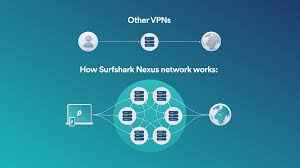The Evolution of VPN Technologies
Virtual Private Networks (VPNs) have revolutionised the way we access and secure our online activities. Originally developed as a means for remote workers to connect securely to their corporate networks, VPN technologies have since evolved to cater to a wide range of users for various purposes.
One of the key benefits of VPNs is their ability to encrypt data transmitted over public networks, such as the internet. This encryption ensures that sensitive information remains secure and protected from prying eyes. Additionally, VPNs allow users to mask their IP addresses, providing anonymity and enhancing privacy while browsing online.
Over the years, VPN technologies have advanced significantly in terms of speed, security, and ease of use. Modern VPN services offer high-speed connections, multi-device support, and a variety of server locations to choose from. Some VPN providers also incorporate additional features like ad-blocking, malware protection, and split tunneling for enhanced functionality.
Businesses have also embraced VPN technologies to secure their data transmissions and enable remote access for employees working from various locations. By utilising VPNs, organisations can establish secure connections between different offices or allow employees to connect securely to company resources while working remotely.
As cyber threats continue to evolve, the importance of using a reliable VPN service cannot be overstated. Whether you are concerned about your online privacy, accessing geo-restricted content, or safeguarding your business data, a VPN can provide you with the necessary tools to navigate the digital landscape safely and securely.
In conclusion, VPN technologies have come a long way since their inception and have become indispensable tools for individuals and businesses alike. With their robust security features and versatile applications, VPNs continue to play a vital role in ensuring online safety and privacy in an increasingly interconnected world.
Understanding VPN Technologies: Key Questions Answered
- What are the technologies required for VPN?
- How many types of VPN technologies are there?
- What is the best VPN technology?
- What are the 5 types of VPN?
- What are the three types of VPNs?
What are the technologies required for VPN?
To establish a Virtual Private Network (VPN), several key technologies are required to ensure secure and encrypted communication over the internet. These technologies include encryption protocols such as IPSec (Internet Protocol Security) and SSL/TLS (Secure Sockets Layer/Transport Layer Security) for data encryption, authentication mechanisms like certificates and pre-shared keys to verify the identities of users and devices, tunneling protocols such as PPTP (Point-to-Point Tunneling Protocol) and L2TP (Layer 2 Tunneling Protocol) for creating secure communication channels, and VPN clients or software applications that facilitate the connection between users and the VPN server. By integrating these essential technologies, VPNs can effectively safeguard data transmission and protect user privacy in the digital realm.
How many types of VPN technologies are there?
When it comes to VPN technologies, there are primarily three main types that are commonly used: remote access VPN, site-to-site VPN, and mobile VPN. Remote access VPN allows individual users to securely connect to a private network from a remote location. Site-to-site VPN, on the other hand, enables secure communication between multiple sites or offices over the internet. Mobile VPN is designed for users on the go, providing a secure connection for mobile devices accessing the internet through public networks. Each type of VPN technology serves specific purposes and offers unique benefits in terms of security and accessibility for users in different scenarios.
What is the best VPN technology?
When it comes to determining the best VPN technology, the answer can vary depending on individual needs and preferences. There are numerous VPN technologies available, each with its own set of features and capabilities. Factors such as encryption strength, server locations, speed, device compatibility, and privacy policies all play a role in determining the best VPN technology for a particular user. It is essential to research and compare different VPN providers to find the one that aligns most closely with your specific requirements for security, privacy, and performance. Ultimately, the best VPN technology is one that offers a balance of robust security measures, user-friendly interface, reliable performance, and transparent privacy practices to ensure a safe and seamless online experience.
What are the 5 types of VPN?
When it comes to VPN technologies, there are five main types of VPNs that cater to different needs and preferences. These include Remote Access VPN, Site-to-Site VPN, Intranet-based VPN, Extranet-based VPN, and Mobile VPN. Each type serves a specific purpose, whether it’s providing secure remote access for individual users (Remote Access VPN), connecting multiple sites within a corporate network (Site-to-Site VPN), or enabling secure communication between trusted partners or vendors (Extranet-based VPN). Understanding the distinctions between these five types of VPNs can help users choose the most suitable option based on their requirements and security considerations.
What are the three types of VPNs?
There are three main types of VPNs: remote access VPN, site-to-site VPN, and intranet-based VPN. Remote access VPNs allow individual users to connect to a private network securely from a remote location, such as working from home or travelling. Site-to-site VPNs enable secure communication between different networks across locations, such as connecting branch offices to a central headquarters. Intranet-based VPNs are used within a company’s internal network to provide secure access to employees working within the organisation. Each type of VPN serves specific purposes and offers varying levels of connectivity and security based on the needs of users and organisations.

